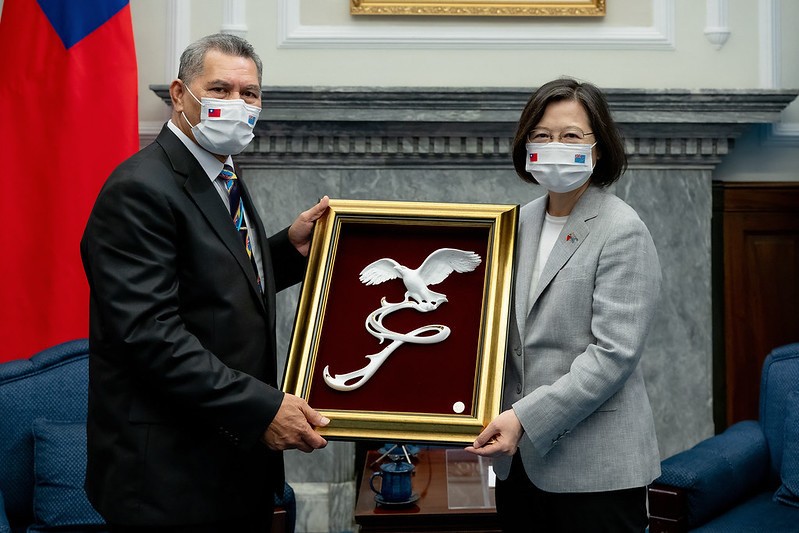Tuvalu, a small Pacific island nation and one of the world's smallest, is headed to the polls on Friday to cast their vote in the election. The election will be watched from Beijing and Taipei to Canberra, as citizens choose a 16-seat parliament followed by negotiations and then a prime minister.

Tuvalu is a former British colony with a population of about 11,500, and only recently gained its independence in 1978. The British monarch is still the country's head of state.
Tuvalu's minimal altitude of coral atolls makes it especially vulnerable to global warming, and there are concerns that rising sea levels and strengthened storms will make it uninhabitable. The current Prime Minister, Kausea Natano, is attempting to raise the islands 4 to 5 meters above sea level through land reclamation, reported The Associated Press.
The international attention on the Tuvalu elections stems from the heightening importance of China's role in the region and Tuvalu's diplomatic ties to the government of Taiwan. A potential security treaty with Australia is also up in the air.
In a Tuvalu election, there are no political parties. All candidates run as independents, with the leading contenders in each of the eight island electorates going to parliament. A period of serpentine negotiations will follow, where the 16 newly elected parliamentary members establish factions. The largest of the group will form a government and elect the prime minister.
According to The Guardian, even if the current prime minister, Natano, successfully defends his seat of Funafuti, the islands' capital, he may not be re-elected as the nation's leader. Seve Paeniu, who serves as Natano's finance minister, is aiming for the prime ministership and has already secured a seat in parliament by running unopposed in his electorate of Nukulaelae. Paeniu has allegedly begun talks with other candidates in the hope of solidifying his leadership.
What Does This All Mean for China and Taiwan?
Tuvalu is one of only 12 countries in the world that maintains diplomatic relations with Taiwan. The nearby Pacific nation of Nauru switched its allegiance from Taiwan to China earlier this month, just days after the presidential elections in Taiwan.
There is speculation that Tuvalu may do the same in its upcoming elections, despite Taiwan's foreign ministry official Eric Chen shutting down such rumors. "The Tuvalu government once again emphasized that it will firm up diplomatic ties with us," said Chen at a recent press briefing.
Under Natano's administration, Tuvalu has maintained strong ties with Taiwan, with the Prime Minister visiting Taipei in 2022 as part of an official delegation. Natano reaffirmed his support of Taiwan in November during the Pacific Islands Forum., disclosing Beijing had approached his government with the opportunity to form a diplomatic union. However, it was swiftly rejected because China "didn't allow us to have two diplomatic ties with Taiwan and them," revealed The Guardian.
Opposition leader Enele Sopoaga, who is also vying for another term, has served as Tuvalu's ambassador to Taiwan, told the Guardian he "strongly believe[s] Tuvalu should continue to recognize Taiwan as a sovereign independent state and a diplomatic friend."
However, Paeniu said if he were to become prime minister, he would "review" the country's relationship with Taiwan and China to ensure Tuvalu's foreign policy was the most beneficial to the country.
"Even within our government that has led Tuvalu for the past four years, we also have different and differing opinions on certain topics, including the Taiwan-China issue," he told the Guardian. "So I take the view that this is something that is open for review."
How Does This Affect Australia's Treaty with Tuvalu?
Foreign policy is expected to take on a major role in the leadership bids of the candidates, and a migration and security treaty signed between Tuvalu and Australia is a central focus. The deal has yet to be ratified by either country and has led to heated debate among Tuvalu's parliament. Sopoaga has said he will scrap the deal-- if elected prime minister.
"The arrangement is one sided, it's all to do with what Tuvalu must commit [to], but Australia is not committing [to] anything at all," Sopoaga told the Guardian.
However, Paeniu, who helped facilitate the agreement with Australia, says he would continue to support the treaty and ensure it goes into effect if elected. He said he would make "slight modifications" to a controversial detail in the agreement stating Tuvalu must "mutually agree with Australia" if it wants to strike deals with any other country on security or defense-related issues.
"That's something that would need to be negotiated with Australia," Paeniu said.
Results from Tuvalu's election are expected to be announced on Friday night, with a government formed in the days that follow.
© 2025 HNGN, All rights reserved. Do not reproduce without permission.









